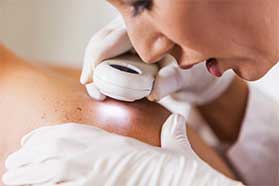Basal Cell Carcinoma Treatment in Cape Coral, FL

What Is Basal Cell Carcinoma?
Non-melanoma skin cancer is one of the most common forms of cancer in the world. Almost 3 million people are diagnosed each year in the U.S. alone, and basal cell carcinomas (BCCs) make up 80 percent of those cases—making BCCs the most commonly diagnosed type of skin cancer.
BCCs are abnormal lesions or areas of raised skin that form on the outermost layer of skin called the basal layer. Unlike malignant melanomas—which are the most serious type of skin cancer—basal cell carcinomas tend not to spread and are considered the easiest form of skin cancer to treat.
While basal cell carcinoma can be treated and cured, making sure your skin abnormalities do not indicate something more serious is at play is essential. Schedule a consultation with a healthcare practitioner in Cape Coral who specializes in basal cell carcinoma treatment. Call (239) 425-2900 or contact Dr. Doreen DeStefano online.
What Causes Basal Cell Carcinoma?
The primary cause of most types of skin cancer is sunlight exposure that results in sunburn. Skin cancer is the uncontrolled growth of skin cells. UV light from the sun can damage DNA and cause your skin to grow abnormally. Other causes and risk factors for skin cancer and BCC may include:
- Chemical exposure (e.g., tar, coal, etc.)
- Tanning bed use
- Compromised immune system
- Family history of skin cancer
- Freckles or moles, especially “atypical” or very large moles
- Fair skin, blue eyes or blond/red hair
Basal Cell Cancer Symptoms
The most common BCC symptoms include:
- Red patches of irritated or inflamed skin
- A scar-like area of skin
- Shiny bumps that resemble moles
- Long lasting open sores that ooze, crust or bleed
- A red or pink growth that crusts in the center
These bumps/lesions tend to manifest on areas of the skin most frequently exposed to the sun, such as the face and neck. Basal cell carcinoma can also resemble noncancerous skin conditions like eczema and psoriasis. Your healthcare provider will examine the skin lesions and review your medical history to arrive at a BCC diagnosis. He or she may do a skin biopsy to determine if you have skin cancer and, if you do, what type of skin cancer.
Treatment for Basal Cell Carcinoma
There are several treatments for basal cell carcinoma; the treatment you undergo will be dependent on the severity, location and size of BCC lesions, as well as if BCC is recurrent.
Your options for treatment include:
- Topical medications rubbed onto the tumor several times a week, for many weeks, which work to stimulate the immune system to attack cancer cells
- Curettage and electrodesiccation: A process in which a curette (instrument with ring-shaped tip) scrapes off the cancer and then the tumor site is desiccated (burned) with an electrocautery needle to destroy any remaining cancer cells
- Mohs surgery: A surgical procedure in which thin layers of tissue that contain the tumor are removed one layer at a time and closely examined under a microscope until the skin is considered clear
- Surgical excision: A surgical procedure in which the tumor and normal-looking skin around the tumor are cut out
- Cryosurgery: A procedure in which BCC removal involves liquid nitrogen to freeze and thereby kill cancer cells
- Radiation, typically reserved for BCCs that cannot be removed surgically or for people who cannot withstand surgery, focuses high-energy waves on cancer cells to destroy them
- Oral medications, typically reserved for instances where basal cell carcinoma spreads to other areas of the body or when other treatments fail, help to block signals that promote cancer growth
The outlook for basal cell carcinomas is excellent. Almost all cases are cured when detected, diagnosed and treated early. If you have abnormal lesions or bumps on your skin, it's imperative you seek medical care from a healthcare practitioner experienced in basal cell carcinoma and other skin abnormalities. Call (239) 425-2900 or contact Dr. Doreen DeStefano online.
Root Causes Holistic Health & Medicine
Address
12734 Kenwood LnSuite 84
Fort Myers, FL 33907
(239) 425-2900
www.rtcausesmd.com
Hours
Mon:
10:00 am - 5:00 pm
Wed:
10:00 am - 5:00 pm
Fri:
10:00 am - 5:00 pm

